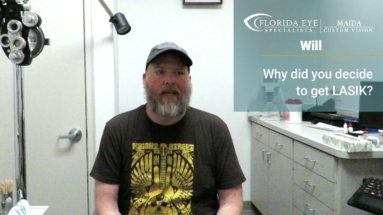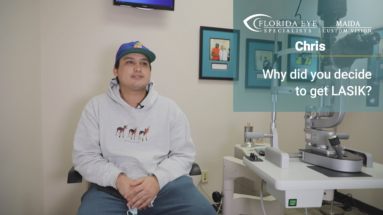Hear from our Clinical Director and Laser Suite Supervisor, D.D. Jewell, about what you can expect during your complimentary LASIK…
Testing Options for Dry Eye Syndrome

Dr. Jerry Maida has helped countless patients in and around Jacksonville deal with a diverse array of eye problems and vision issues. One such issue is chronic dry eyes/dry eye syndrome, which can be a source of discomfort and poor vision.
We’d like to take this opportunity to go over the basics of dry eye and then consider the different options we have when it comes to testing and diagnosis.
About Dry Eye
Dry eye refers to a lack of tear production in the eyes, resulting in itchiness, redness, and poor vision. This may be the result of occasional spells of dry eye, or the condition may be chronic, meaning that patients suffer from a persistent lack of moisture in their eyes.
Causes of Dry Eye
There are a number of things that can cause an attack of dry eye or chronic dry eye syndrome. They are as follows:
- The Aging Process – Tear production often slows down as part of the aging process. Many people older than 65 experience dry eye, sometimes of the chronic variety rather than occasional attacks.
- A Person’s Gender – Women are more likely to experience dry eye than men. This is due to various hormonal changes associated with pregnancy, menopause, and the use of oral contraceptives.
- Medical Conditions – Dry eye is a common symptom of various health conditions, including rheumatoid arthritis, diabetes, and thyroid conditions.
- The Side Effects of Medications – A number of prescription drugs for blood pressure, depression, and allergies can cause dry eye as one of the side effects.
- LASIK and Refractive Surgery – One of the side effects of LASIK surgery is an increase instance of dry eye due to the flap created in the cornea.
- Environmental Factors – When you are in a windy, smoky, arid, or dusty place, there is an increased risk of experiencing dry eye.
Combinations of the above are not uncommon.
Comprehensive Eye Examination
The fundamentals are always a good starting place. A comprehensive eye examination will note the patient’s tear ducts and anatomy of the eye, while also taking into account the eyelids and the manner in which a patient blinks. These can all help in determining an ideal treatment for a patient.
Schirmer Tear Test: Tear Volume
This type of dry eye test measures the volume of tears that your eyes produce. An eye doctor will place a small blotting-paper strip below the lower eyelids in order to safely note tear volume.
Assessing Tear Quality
Tears are more than just salty water. They are comprised of a combination layers (mucus, salt water, oil) that comprise the tear film. If there are issues with the composition of your tears, this can lead to issues with dry eye.
Noting the Surface Quality of the Eyes
Special eye drops are sometimes used in order to determine how your tears interact with your eyes. For instance, staining eye drops can help determine if your tears evaporate too quickly.
Putting It All Together
In addition to the above tests, an eye doctor will also note patient medical history and other factors. This will help when determining the best route of treatment and dry eye management.
Learn More About Testing for Dry Eye
For more information about dry eye syndrome and how it can be properly diagnosed and treated, be sure to contact our laser vision correction center today. Dr. Jerry Maida and the entire team at the practice will work with you to develop the right treatment for your needs.




